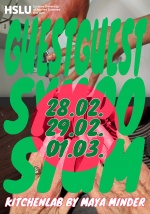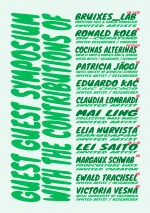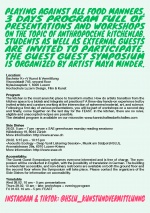Difference between revisions of "Guest Guest kitchenlab"
| Line 80: | Line 80: | ||
'''Thursday 29.2.2024''' divers locations! | '''Thursday 29.2.2024''' divers locations! | ||
| − | + | <br> | |
| + | LUNCH LUNCH LUNCH 13h is provided by K++V | ||
| + | <br><br> | ||
'''Workshop 1: Cocinas Alterinas - Plural colors of the Sauerkraut'''<br> | '''Workshop 1: Cocinas Alterinas - Plural colors of the Sauerkraut'''<br> | ||
with Mayar el Bakry & Gabriela Aquije Zegarra<br> | with Mayar el Bakry & Gabriela Aquije Zegarra<br> | ||
| − | Place: Raum für Farben, EG, room 097<br> | + | Place: HSLU K++V, Raum für Farben, EG, room 097<br> |
<br> | <br> | ||
[[File:KF_28102023 57.jpg|400px]] | [[File:KF_28102023 57.jpg|400px]] | ||
| Line 104: | Line 106: | ||
'''Workshop 2: Bruixes_Lab - Outré Pelle / the second skin'''<br> | '''Workshop 2: Bruixes_Lab - Outré Pelle / the second skin'''<br> | ||
with Christina Dezi und Giulia Tomasello <br> | with Christina Dezi und Giulia Tomasello <br> | ||
| − | Place: Bewegungsraum, 2nd floor, room 251<br> | + | Place: HSLU K++V, Bewegungsraum, 2nd floor, room 251<br> |
<br> | <br> | ||
[[File:Bruixes.jpg|400px]] | [[File:Bruixes.jpg|400px]] | ||
| Line 117: | Line 119: | ||
<br> | <br> | ||
<br> | <br> | ||
| − | '''Workshop 3'''<br> | + | '''Workshop 3: "what i hear, hears me - what i play, plays me”'''<br> |
| + | with Patricia Jäggi and Claudia Lombardi<br> | ||
| + | Place: HSLU K++V, Gruppenraum 2nd floor, room 250<br> | ||
<br> | <br> | ||
[[File:workshop (1).jpg|400px]] | [[File:workshop (1).jpg|400px]] | ||
<br> | <br> | ||
<br> | <br> | ||
| − | + | Patricia and Claudia warmly invite to a collective moment in which we engage in auditory-sensory experiences with our ears, voice, bodies and senses to reflect on the role of trained perceptual hierarchies of our surroundings. We will dive into Deep Listening**& Decolonial Listening** and reflect on how our auditory perception is shaped by socio-cultural patterns and trained perceptual filters that (unconsciously) reproduce hierarchies. We invite you to listen, to play, to participate actively as well as passively. We will focus on the sounds we encounter during the symposium and critically engage further with these sounds during the workshop. A workshop on decolonial listening, auditory - sensory experience, pls bring your favorite vinyl with you. The workshop is connected to the SIDE DISH Deep Vinyl listening Session. <br> | |
| − | |||
| − | |||
| − | Patricia and Claudia warmly invite to a collective moment in which we engage in auditory-sensory experiences with our ears, voice, bodies and senses to reflect on the role of trained perceptual hierarchies of our surroundings. We will dive into Deep Listening**& Decolonial Listening** and reflect on how our auditory perception is shaped by socio-cultural patterns and trained perceptual filters that (unconsciously) reproduce hierarchies. We invite you to listen, to play, to participate actively as well as passively. We will focus on the sounds we encounter during the symposium and critically engage further with these sounds during the workshop. | ||
| − | <br | ||
*aus Pauline Oliveros Deep Listening: A Composer's Sound Practice [https://www.agosto-foundation.org/sites/default/files/upload/oliveros_pauline_deep_listening_a_composers_sound_practice_2005.pdf]<br> | *aus Pauline Oliveros Deep Listening: A Composer's Sound Practice [https://www.agosto-foundation.org/sites/default/files/upload/oliveros_pauline_deep_listening_a_composers_sound_practice_2005.pdf]<br> | ||
**aus dem Essay: "Border-Listening / Escucha- Liminal: Decolonial Listening: Sonorous Bodies and the Urban Unsconscious in Mexico City, Essay by Donovan Adrian Hernandez Castellanos and Rodrigo Toro [https://radicalsoundslatinamerica.com/wp-content/uploads/2020/11/borderlistening11.pdf] | **aus dem Essay: "Border-Listening / Escucha- Liminal: Decolonial Listening: Sonorous Bodies and the Urban Unsconscious in Mexico City, Essay by Donovan Adrian Hernandez Castellanos and Rodrigo Toro [https://radicalsoundslatinamerica.com/wp-content/uploads/2020/11/borderlistening11.pdf] | ||
<br> | <br> | ||
| − | + | Biography<br> | |
| − | + | Claudia Lombardi is a student in Art Education at the HSLU. Her interest lies within the permeability of bodies (also more-than-human bodies) and their porous properties. Claudia understands encounters between bodies as opportunities for collective un-learning. She’s currently exploring how these collective moments can activate the permeable properties of bodies to foster a sensibility that dismantles the imposition of western thought and cultivates connections beyond western perspectives. This exploration unfolds in experimental workshops, writing processes or working with morphogenetic processes.<br> | |
| + | Patricia Jäggi is a cultural anthropologist and sound researcher. She works on the politics, identites and histories of sound and listening as well as in the fields of sound art and acoustic ecology. Furthermore, she has developed soundwalks, composed listening pieces and was part of curatorial teams of sound art exhibitions such as "Radiophonic Spaces" (Tinguely Museum Basel, Haus der Kulturen der Welt Berlin). She works as a senior research associate at the Lucerne University of Applied Sciences and Arts – Music and at the Institute for Department of Social Anthropology and Cultural Studies.<br> | ||
| + | <br> | ||
<br> | <br> | ||
| + | '''Workshop 4: Forest, Sprouts and Mushrooms - Culinary Tree Seedlings and Food Forests'''<br> | ||
| + | With Lei Saito and Ewald Trachsel<br> | ||
| + | Place: Ewald Trachsel’s «Wirtschaftswald im Emmental», Tschättebach 16, 3465 Dürrenroth<br> | ||
| + | <br> --> Different Location than HSLU<br> | ||
<br> | <br> | ||
| − | + | [[File:EwaldTrachsel_Foodforest.jpeg|300px]] | |
| + | [[File:LeiSaito.jpg|300px]] | ||
<br> | <br> | ||
| − | |||
| − | |||
<br> | <br> | ||
A cooking workshop lead by Lei Saito, with an additional field trip to visit Ewald Trachsel's Food Forest.<br> | A cooking workshop lead by Lei Saito, with an additional field trip to visit Ewald Trachsel's Food Forest.<br> | ||
| − | + | Lei Saito is interested in history, in narratives that are superimposed in layers, which she explores through various techniques, such as drawing, ceramic, photogravure, sculpture, photography, and installations. Very early in her practice, she developed a series of performances and culinary installations—the "Cuisine Existentielle" (existential cuisine)—an edible landscape. Her works are proposals for an experience that is beautiful, delicious and conceptual at once. She creates "decapitated" pastries dressed in raspberry coulis for a July 14 party at the Palais de Tokyo, designs an edible landscape of purple and yellow vegetables for London's Matchesfashion, and installs an ice rink filled with clementine jelly in the Galerie de multiples in Paris. But the artist's world is not only marvelous, her work is built around a complex set of references and meanings, drawing from art history, mythology and language, which is invented between Japanese and French. The compositions that Lei Saito creates are hybridization between culinary traditions, eras, and flavors that together form a new story crystallizing a sensual experience, a new and shared atmosphere. His artistic act aims to create an interaction between people, to make the audience live sensory experience, which then participates in the activation of the work itself. However, this is not a protocol but a characteristic that naturally lies at the heart of her practice: it is all about interaction and balance between the stories she weaves and the experiences she proposes. | |
| − | + | ||
| − | + | Ewald Trachsel: In my artistic work, I question the everyday. In doing so, I refer to what surrounds me in the context of what I do. Be it gardening and the utilisation/cooking of plants, the gathering of mushrooms or the care and cultivation of the forest, whose wood I use to renovate the house and for cooking and heating. Connections! With this in mind, I am offering a workshop entitled "Foodforest in the Emmental". The students will travel by public transport from Emmenbrücke to Dürrenroth, Fuchsloch. I will be waiting for them there. We will walk together in and through the Rotwald. The walk takes about 30 minutes Based on what we see, I will talk about the commercial forest in the Emmental. Maintenance, utilisation, monoculture vs. diversity. At the end of the walk, the students plant and protect approx. 15-20 young plants (future trees) on the plot in the Rotwald that I am currently using and caring for. However, this is only possible if the weather conditions allow it. Planting is not possible in frost and frozen ground! The material, i.e. young plants, stakes and wire baskets to protect the plants are ready, as are gloves. | |
| − | + | '''Appropriate clothing and footwear are recommended. | |
| + | ''' | ||
<br> | <br> | ||
<br> | <br> | ||
Revision as of 14:28, 22 February 2024
GUEST GUEST SYMPOSIUM KITCHENLAB
PLAYING AGAINST ALL FOOD MANNERS. 3 DAYS PROGRAM FULL OF PRESENTATIONS AND WORKSHOPS ON THE TOPIC OF ANTHROPOCENE KITCHENLAB. STUDENTS AS WELL AS EXTERNAL GUESTS ARE INVITED TO PARTICIPATE. THE GUEST GUEST SYMPOSIUM IS ORGANIZED BY ARTIST MAYA MINDER
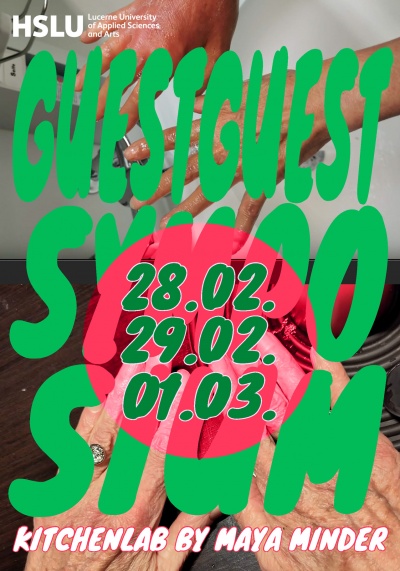
WITH CONTRIBUTIONS BY:
Bruixes_Lab Christina Dezi & Giulia Tomasello [1]
invited artists ITA/ ESP
Ronald Kolb ON-CURATING [2]
invited researcher / curator DE
Cocinas Alterinas [3]
Mayar el Bakry & Gabriela Aquije Zegarra
invited artists / researchers / designers PR/CH/EG
Patricia Jäggi Swiss Society of Acoustic Ecology [4]
invited artist / researcher CH
Eduardo Kac SAIC Chicago [5]
invited artist / researcher US
Claudia Lombardi [6]
invited artist CH
Mai Ling Collective, Mary Maggic [7]
invited artist AT
Elia Nurvista, Bakudapan [8]
invited artist ID
Lei Saito [9]
invited artist FR/JP
Margaux Schwab FOODCULTURE days [10]
invited curator CH
Ewald Trachsel [11]
invited artist / researcher CH
Victoria Vesna, UCLA: University of California [12]
invited artist / researcher US
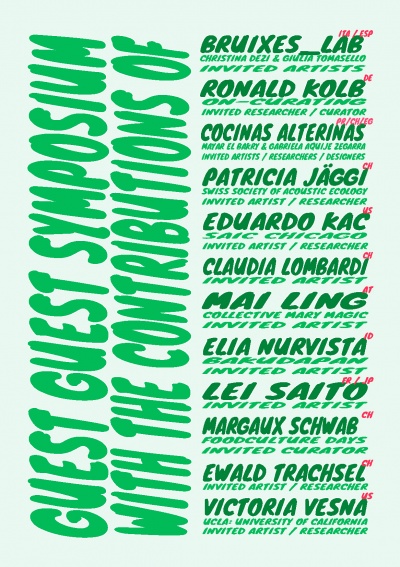
Program
The kitchen is the most anarchic place to transform matter. How do artists transition from the kitchen space to a biolab and integrate art practices? A three-day hands-on experience led by invited artists and curators working at the intersection of ephemeral material, art, and science. Following a first day of various presentations, you will be part of workshops on a second day and finally, come together on the last day for the FEAST. In the kitchen, there are no rules, eligible and unaccepted recipes are possible.
Wednesday, 28.2.2024 - Bewegungsraum, 2nd floor, room 251
10 am Maya Minder, Introduction Kitchenlab guest guest Symposium
11 am Margaux Schwab, Foodculture Days, Vevey
LUNCH LUNCH LUNCH is provided by HSLU
2 pm Mai Ling, Mary Maggic (Zoom)
3 pm Elia Nurvista Food as Practise (Zoom)
4 pm Workshop Introductions
5 pm Victoria Vesna, HOX ZODIAC (Zoom)
6 pm Finish & Select your workshop
Thursday 29.2.2024 divers locations!
LUNCH LUNCH LUNCH 13h is provided by K++V
Workshop 1: Cocinas Alterinas - Plural colors of the Sauerkraut
with Mayar el Bakry & Gabriela Aquije Zegarra
Place: HSLU K++V, Raum für Farben, EG, room 097
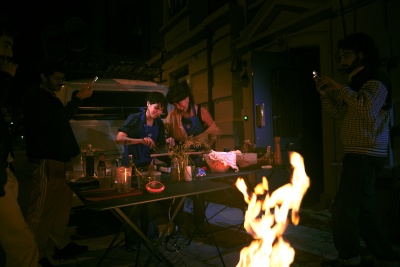
What ecological and political entanglements can we make visible or experience through our seasonal food and local landscapes?
A workshop on fermentation and color extraction Kitchens can be sites of exploitation or care, depending on their politics. Similarly, design and art follow the same logic. Colours being one of the most important elements in understanding and shaping our visual world, warrant special attention. Our umbrella question will be: What ecological and political entanglements can we make visible or experience through our seasonal food and local landscapes? During this workshop, we will bridge the space between the kitchen and the colour-mixing room by experimenting with different three winter kohl varieties. We’ll start from a sauerkraut recipe and ingredients, to experiment with the possibilities of these materials for color extraction and natural taints.
Biography
Cocinas Alterinas is a critical design collective co-founded in 2019 by the Swiss-Egyptian designer Mayar El Barkry and the Peruvian landscape
architect and artist Gabriela Aquije Zegarra — their work centres around the investigation of food in relation to space, ecologies and politics.
Rooted in their diverse cultural backgrounds and extensive artistic expertise, Cocinas Alterinas collaborates to create various dynamic
formats, including workshops, short films, and performative dinners that explore the complex systems of specific crops and cooking processes.
Through this work, they seek to reflect and mediate plural visions of design, using locally sourced ingredients and communal cooking and eating
practices to foster a deeper connection between people, their environment, and their food. At the heart of their practice lies a commitment to exploring the kitchen as a site of care, recreation, and resistance while forging meaningful
connections between local and global partners and communities.
Workshop 2: Bruixes_Lab - Outré Pelle / the second skin
with Christina Dezi und Giulia Tomasello
Place: HSLU K++V, Bewegungsraum, 2nd floor, room 251
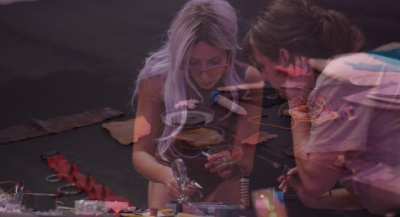
The «OltrePelle» workshop is designed to explore the potential of algae and bacterial cellulose to envision a sustainable future in the realm of intimate technologies. This immersive experience focuses on cultivating living materials and conceptualizing speculative scenarios for second skins, eco-erotic haptic sensors and e-pleasure designs. Participants will discover innovative open-source fabrication techniques for sensory interfaces and imagine how biotechnology and cutting-edge materials can enhance the erotic self-pleasures. Embarking on a critical making process to dismantle societal taboos and stigmas, they will use technology as a means to explore and reclaim sexuality. During the workshop participants will gain hands-on experience in growing algae-based biofabrics, experimenting with sexual body fluids and circuits, and designing sensual haptic skins and e-textiles. Through bio-hacking practices and open source DIY technologies, you will hack your pleasure and create your own kinky wearable device. All materials and tools are included and no prior knowledge of electronics is required. Additionally, enthusiasts can bring extra gadgets or textiles to integrate into their designs, along with their own sexual body fluids for those daring to experiment further.
Biography
LABBruixes Lab is a nomadic lab where biohacking and witchcraft ritualsare performed to create speculative scenarios about intimacy, pleasureand to destigmatize taboos around sexuality. An interactive spacewhere intimate biotechnology, kinky, transfeminist and DIY practicesintertwine in symbiosis with biophilia and bodily fluids.
Bruixes_Lab is Giullia Tomaselli[13] and Christina Dezi[14]
Workshop 3: "what i hear, hears me - what i play, plays me”
with Patricia Jäggi and Claudia Lombardi
Place: HSLU K++V, Gruppenraum 2nd floor, room 250
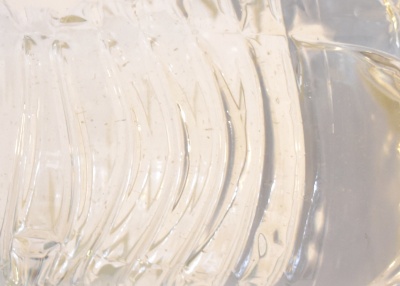
Patricia and Claudia warmly invite to a collective moment in which we engage in auditory-sensory experiences with our ears, voice, bodies and senses to reflect on the role of trained perceptual hierarchies of our surroundings. We will dive into Deep Listening**& Decolonial Listening** and reflect on how our auditory perception is shaped by socio-cultural patterns and trained perceptual filters that (unconsciously) reproduce hierarchies. We invite you to listen, to play, to participate actively as well as passively. We will focus on the sounds we encounter during the symposium and critically engage further with these sounds during the workshop. A workshop on decolonial listening, auditory - sensory experience, pls bring your favorite vinyl with you. The workshop is connected to the SIDE DISH Deep Vinyl listening Session.
- aus Pauline Oliveros Deep Listening: A Composer's Sound Practice [15]
- aus dem Essay: "Border-Listening / Escucha- Liminal: Decolonial Listening: Sonorous Bodies and the Urban Unsconscious in Mexico City, Essay by Donovan Adrian Hernandez Castellanos and Rodrigo Toro [16]
Biography
Claudia Lombardi is a student in Art Education at the HSLU. Her interest lies within the permeability of bodies (also more-than-human bodies) and their porous properties. Claudia understands encounters between bodies as opportunities for collective un-learning. She’s currently exploring how these collective moments can activate the permeable properties of bodies to foster a sensibility that dismantles the imposition of western thought and cultivates connections beyond western perspectives. This exploration unfolds in experimental workshops, writing processes or working with morphogenetic processes.
Patricia Jäggi is a cultural anthropologist and sound researcher. She works on the politics, identites and histories of sound and listening as well as in the fields of sound art and acoustic ecology. Furthermore, she has developed soundwalks, composed listening pieces and was part of curatorial teams of sound art exhibitions such as "Radiophonic Spaces" (Tinguely Museum Basel, Haus der Kulturen der Welt Berlin). She works as a senior research associate at the Lucerne University of Applied Sciences and Arts – Music and at the Institute for Department of Social Anthropology and Cultural Studies.
Workshop 4: Forest, Sprouts and Mushrooms - Culinary Tree Seedlings and Food Forests
With Lei Saito and Ewald Trachsel
Place: Ewald Trachsel’s «Wirtschaftswald im Emmental», Tschättebach 16, 3465 Dürrenroth
--> Different Location than HSLU
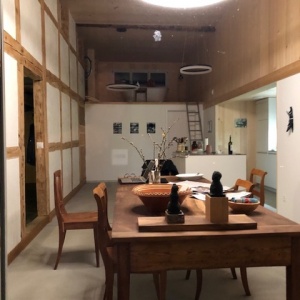
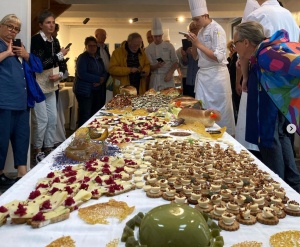
A cooking workshop lead by Lei Saito, with an additional field trip to visit Ewald Trachsel's Food Forest.
Lei Saito is interested in history, in narratives that are superimposed in layers, which she explores through various techniques, such as drawing, ceramic, photogravure, sculpture, photography, and installations. Very early in her practice, she developed a series of performances and culinary installations—the "Cuisine Existentielle" (existential cuisine)—an edible landscape. Her works are proposals for an experience that is beautiful, delicious and conceptual at once. She creates "decapitated" pastries dressed in raspberry coulis for a July 14 party at the Palais de Tokyo, designs an edible landscape of purple and yellow vegetables for London's Matchesfashion, and installs an ice rink filled with clementine jelly in the Galerie de multiples in Paris. But the artist's world is not only marvelous, her work is built around a complex set of references and meanings, drawing from art history, mythology and language, which is invented between Japanese and French. The compositions that Lei Saito creates are hybridization between culinary traditions, eras, and flavors that together form a new story crystallizing a sensual experience, a new and shared atmosphere. His artistic act aims to create an interaction between people, to make the audience live sensory experience, which then participates in the activation of the work itself. However, this is not a protocol but a characteristic that naturally lies at the heart of her practice: it is all about interaction and balance between the stories she weaves and the experiences she proposes.
Ewald Trachsel: In my artistic work, I question the everyday. In doing so, I refer to what surrounds me in the context of what I do. Be it gardening and the utilisation/cooking of plants, the gathering of mushrooms or the care and cultivation of the forest, whose wood I use to renovate the house and for cooking and heating. Connections! With this in mind, I am offering a workshop entitled "Foodforest in the Emmental". The students will travel by public transport from Emmenbrücke to Dürrenroth, Fuchsloch. I will be waiting for them there. We will walk together in and through the Rotwald. The walk takes about 30 minutes Based on what we see, I will talk about the commercial forest in the Emmental. Maintenance, utilisation, monoculture vs. diversity. At the end of the walk, the students plant and protect approx. 15-20 young plants (future trees) on the plot in the Rotwald that I am currently using and caring for. However, this is only possible if the weather conditions allow it. Planting is not possible in frost and frozen ground! The material, i.e. young plants, stakes and wire baskets to protect the plants are ready, as are gloves.
Appropriate clothing and footwear are recommended.
Friday 1.3.2024 Feast
10 am Roland Kolb - Post-Exhibitionary Practices
11-16h FEAST, Kitchenlab and final presentation from the workshop outcomes
A feast full of cooking, installation, presentation and gatherings.
16h Eduardo Kac on bioart practices.
Side Dishes
Mo. 26.02. 5 pm – 7 pm «arvae x SAE greenhouse monday reading sessions»
Häldeliweg 19, 8044 Zürich
More information: http://www.arvae.ch
Thu. 29.02. 6:15 pm – 10:15 pm
«Acoustic Ecology - Deep Vinyl Listening Session», Musik am Südpol (HSLU),
Arsenalstrasse 28a, 6010 Luzern-Kriens
More information: http://www.ssae.ch
Accessibility
The Guest Guest Symposium welcomes everyone interested and is free of charge. The symposium will be conducted in English, with the possibility of translation in German. The building is wheelchair accessible, and non-binary restrooms are available on both the ground floor and the second floor, where the Symposium will take place. Please contact the organizers of the Side Dishes for information on accessibility.
Location
Bachelor K++V Kunst & Vermittlung
Viscosistadt 745, second floor
Nylsuisseplatz 1, 6020 Luzern
Hochschule Luzern Design, Film & Kunst
INSTAGRAM & TIKTOK: @HSLU_KUNSTUNDVERMITTLUNNG [17]
